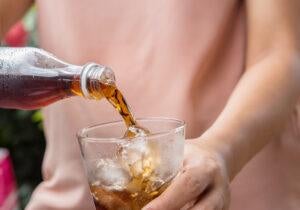 The information provided here is intended to be used for educational purposes. Links to other resources and websites are intended to provide additional information aligned with this educational purpose.
The information provided here is intended to be used for educational purposes. Links to other resources and websites are intended to provide additional information aligned with this educational purpose.
Low- and no-calorie sweeteners are man-made sweeteners that are much sweeter than regular sugar but have few to no calories.1
-
Low- and no-calorie sweeteners are sometimes called artificial sweeteners, high-intensity sweeteners, and non-nutritive sweeteners.1-3
-
There are 19 different low- and no-calorie sweeteners,4 six of which are approved by the US Food and Drug Administration as food additives: advantame, aspartame, acesulfame potassium, neotame, saccharin, and sucralose.1
-
Two other kinds of low- and no-calorie sweeteners—steviol glycosides from the stevia plant and extracts from the monk fruit—are considered “Generally Recognized as Safe,” which allows them to be used in food and drinks.2
Data from 2009-2012 show that about 19% of kids and 31% of adults in the US drink beverages made with low- and no-calorie sweeteners.5
-
This is a big increase from 1999-2000, when only 6% of kids and about 19% of adults were drinking these beverages.6
-
During both of these time periods, non-Hispanic White Americans were more likely to report drinking these beverages than non-Hispanic African Americans and Hispanic Americans as well as those with a high income compared to those with a middle or low income.5,6
There are mixed findings about the health effects of drinking low- and no-calorie sweetened drinks and multiple concerning studies.7,8 Ongoing research is looking at long-term impacts on the body for kids and adults.9
-
There’s some good evidence that suggests replacing sugary drinks (like soda) with low- and no-calorie sweetened drinks is a strategy to avoid excess weight gain in children.10
-
However, experts suggest replacing sugary and artificially-sweetened drinks with water, if possible. Water is an excellent beverage choice, especially for kids. It’s perfect for hydration, very affordable, has no calories, and fluoridated water helps protect teeth.11
Suggested Citation
Get the Facts: Low- and No-Calorie Sweetened Drinks. Prevention Research Center on Nutrition and Physical Activity Team at the Harvard T.H. Chan School of Public Health, Boston, MA; November 2022.
Funding
This work is supported by The JPB Foundation and the Centers for Disease Control and Prevention (U48DP006376). The findings and conclusions are those of the author(s) and do not necessarily represent the official position of the Centers for Disease Control and Prevention or other funders. The information provided here is intended to be used for educational purposes. Links to other resources and websites are intended to provide additional information aligned with this educational purpose.
©2015 President and Fellows of Harvard College. All rights reserved. The CHOICES name, acronym and logo are marks of the President and Fellows of Harvard College.